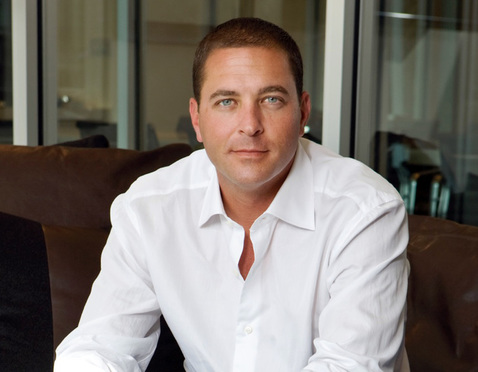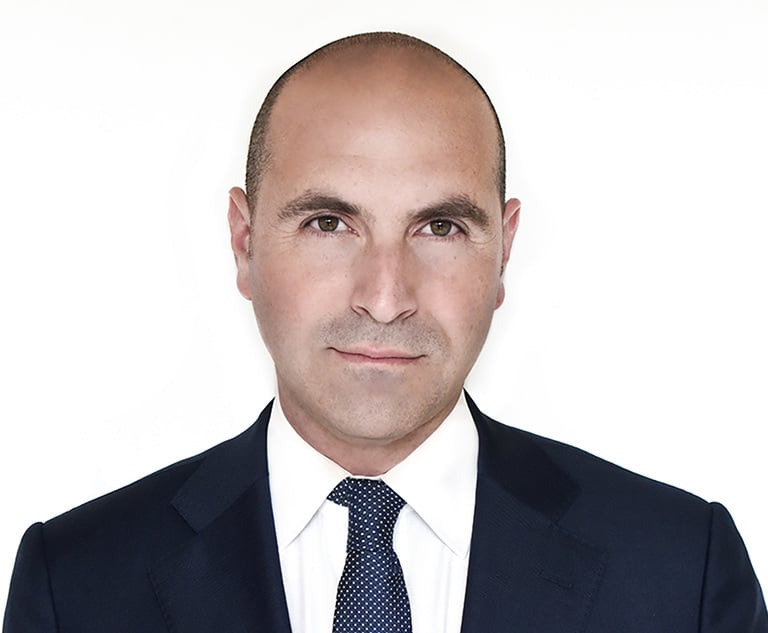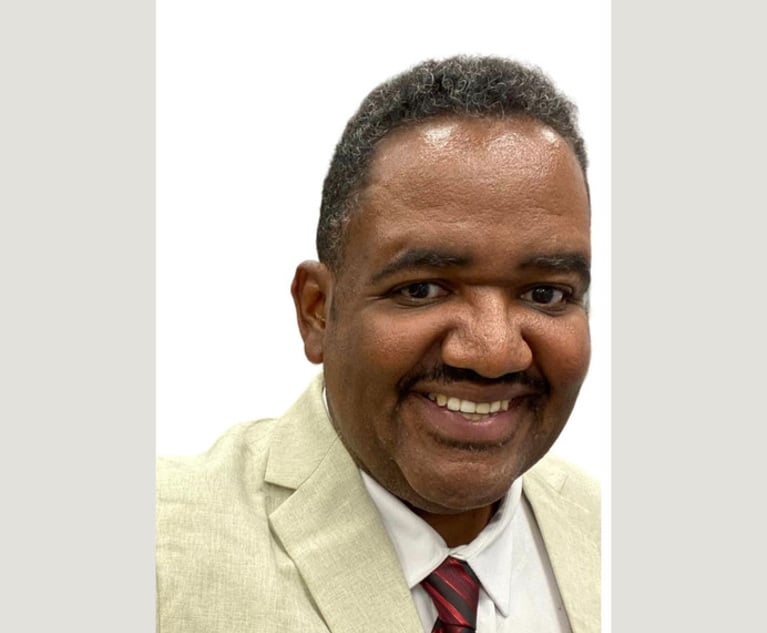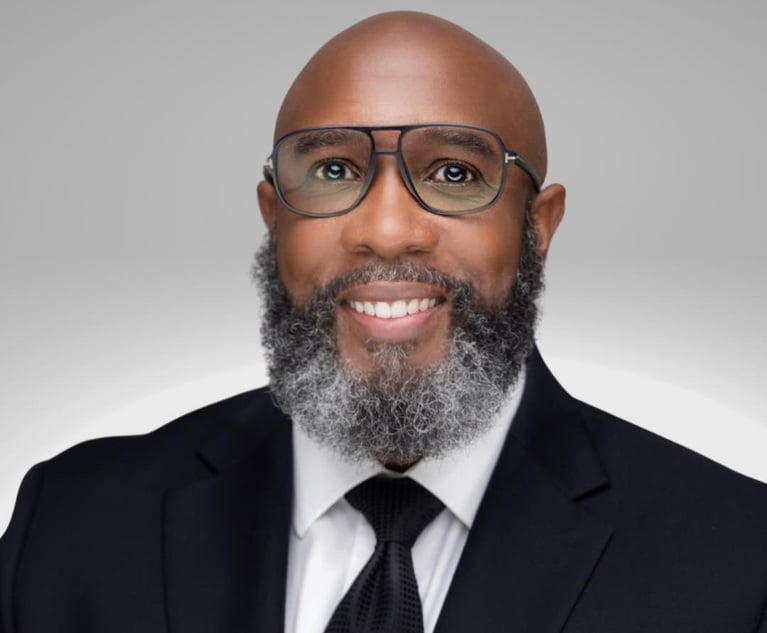'I Believed in Jeremy': Why a Small Firm Stood With a Disgraced South Florida Lawyer
Jeremy Alters' Florida operations dwindled from 57 people in 2010 to about 18 one year later. Now, in 2018, he is down to five colleagues, including two other attorneys.
May 17, 2018 at 01:44 PM
9 minute read
 Jeremy Alters of Morelli Alters. Courtesy photo
Jeremy Alters of Morelli Alters. Courtesy photo
Jeremy Alters is a man at the edge of a precipice, facing the potential end of a once-storied legal career.
His life these past eight years has been a cautionary tale after a high-profile disciplinary case prosecuted by the Florida Bar.
On the one hand, it's a horror story about a prominent lawyer's fall from feting with world leaders and Hollywood movie stars, to operating for a short period from a warehouse with a roll-up door.
But on the other, it's also an unlikely tale of friendship—friendship lost and friendship proven as floodwaters literally rose in his makeshift office space.
Last week, Florida justices weighed his fate during oral arguments before the state Supreme Court. It didn't appear to go well for Alters, as justices seemed to be considering disbarment or a “substantial suspension,” despite a court-appointed referee's recommendation of no sanctions.
Upset by what he considers unfair news coverage of the hearing, Alters spoke with the Daily Business Review to “set the record straight.” He agreed to an interview, but it became clear early in the conversation that the onetime lead attorney was not the story here.
The most remarkable aspect of the story is the five people who embrace him, who have chosen to remain with him through a yearslong scandal and who have now gone with him to launch personal injury firm Morelli Alters LLP after his last venture imploded.
They all declined a year's severance package to remain with the firm.
“For me it's really simple,” said Justin Grosz, a former associate who now manages Morelli Alters' Florida practice. “He is my friend and it really doesn't get more complicated than that.”
Grosz stayed with Alters and attorney Matthew T. Moore, who says colleagues still encourage him to cut ties to avoid being swept into the scandal. Both attorneys remember working one Saturday to move into a bug-infested storage unit that would become their temporary work space after the firm could no longer afford its rent. That day rising flood waters forced them to scramble to save their possessions.
“The cockroaches were nice,” Moore quipped.
Then there was the business lost when potential clients googled Alters' name.
“What percentage of clients have you lost because of me?” Alters asked them as they sat together at the conference table at offices in Dania Beach in suburban Broward County.
That same table once graced the pages of The New York Times for a slideshow on “what makes for cutting-edge decor in a law office.” But back then, though, the offices were in Miami's chic Design District.
“I've tried for six and a half years to insulate everyone from the pain of this,” Alters says. “I've acted like we're going to win, it's going to be OK. … It's been terrible for everybody.”
It's a rare downbeat moment for Alters and the people who seem to have unshakable faith in his vindication.
Sharply dressed and charismatic, Alters had honed his public image as a prolific Democratic fundraiser, high-stakes class action litigator and rising star in the legal world. But in the new glass offices of his five-person law firm, there's a glimpse of something else: The man who had once captivated jurors on landmark litigation has been forced out of courtroom front rows.
“You know what I've been doing for the last six years?” he asks. “I've been fighting for my legal life.”
'Not Who I Thought She Was'
Alters once led Alters Boldt Brown Rash & Culmo. He fell from grace after the Florida Bar alleged he authorized 49 improper transactions from 2009 to 2010 that funneled $1 million of clients' money from his firm's trust account to cover daily operating expenses and his own personal spending.
“One thing is clear: Jeremy Alters violated three of the most fundamental and sacrosanct principles of the Florida Bar,” bar counsel William Mulligan told the high court. “This is a garden-variety misappropriation case.”
Alters claimed he was at first unaware of the violations, but admitted in court and in an interview with DBR that he did not report them to the bar when he did find out. He instead repaid the money and continued to operate for about a year before his former nanny-turned-bookkeeper filed a bar complaint against him. He claims he hid the truth for two reasons. The first was to shield the firm he had built from immediate disbandment. The second was allegedly to protect managing partner Kimberly Boldt, who he claims committed the ethics violations.
“She's not who I thought she was,” Alters said. “But at that time, who I thought she was, there was no way on God's green earth I was going to report her.”
Boldt and Alters had gone into business together after years of friendship. They had met as young lawyers when they both worked for the same firm. But under the glare of the Florida Bar investigation and the public scrutiny that came with it, they turned on each other.
Alters alleges Boldt admitted the misappropriation, wrote a confession letter to the bar, but never sent it. Boldt denies this. She claims Alters authorized every transaction, then later sought to pin the blame on her.
“We can categorically deny that he protected Ms. Boldt from anything and flatly deny that Ms. Boldt lied in these proceedings in any manner,” Boldt's attorney, Hank Coxe of Bedell Dittmar Devault Pillans & Coxe in Jacksonville, told the Daily Business Review Wednesday.
The Florida Bar appeared to believe Boldt. It dismissed most of its charges against her and recommended she attend an ethics class. Boldt's Florida Bar file shows no disciplinary actions against her in the last 10 years.
But the bar pressed its case against Alters, drawing a scathing report from a court-appointed referee, who concluded the Florida Bar ”stridently pursued the wrong lawyer” for five years.
The referee, Miami-Dade Circuit Judge Marcia Caballero, concluded the bar ignored evidence, disregarded credible witnesses and seemed intent on prosecuting Alters. She recommended the bar pay the attorney $143,000 for years of litigation.
The bar appealed to the Supreme Court, asking the justices to review the referee's report that cleared Alters of four major charges but found him guilty of failing to prevent recurring problems created by others at his firm. It asked the court to disbar Alters.
'That's When the Trouble Began'
Moore said the May 8 hearing was hard to watch.
It seems Alters' side expected a different reaction from the justices, who made it clear they would punish the attorney for the trust account violations.
But the high court also seemed to be weighing at least two mitigating factors.
“Did he not make full restitution?” Chief Justice Jorge Labarga asked the bar's counsel at one point during the oral arguments.
Alters had, Mulligan replied.
And who had been managing the business side, while Alters handled litigation? It seemed the answer was Boldt.
“The firm apparently, from what I read, never made any money,” the chief justice said. “They were living off the the $2.5 million he funded. And when that ran out, that's when the trouble began.”
That trouble led a once-lauded firm to unravel.
“Everybody had left,” Alters said.
His Florida operations dwindled from 57 people in 2010 to about 18 one year later. Now, in 2018, he is down to five colleagues, including two other attorneys.
But those five are fiercely loyal.
One of them, former paralegal Cindy Russell, took out a $150,000 line of equity on her home to bolster Alters' firm, and offered a $45,000 line of credit when a major lender called in the firm's debt. She said she rallied relatives, who, all told, raised about $800,000 to keep the firm afloat in its leanest years.
“The bottom line is I believed in Jeremy … 100 percent,” said Russell, who has worked with Alters since 2004 and is now a bookkeeper at his current firm. She said Alters repaid her and her family in full with interest.
“I had been in trial … and I thought Jeremy was the most fantastic trial lawyer I had ever seen,” she said.
No one disputes Alters' prowess in the courtroom. At the height of his career, he helped land one of the largest attorney fee awards in South Florida history—a record $123 million from a $410 million class action settlement against Bank of America in 2012.
But there's also no disputing that more than $1 million went missing from his old law firm's trust account.
And that's what the high court might consider, as it decides what will happen to Alters' law license.
Russell hopes he receives the same punishment as Boldt—diversion into an ethics program.
But at least one justice seemed to be leaning in another direction.
“Is there a conceivable universe in which you could imagine this court writing an opinion saying that it's OK to use your trust account as a line of credit to keep your firm afloat as long as you successfully restore everything by hiding the problem?” Justice C. Alan Lawson asked Alters' attorney, Andrew S. Berman, during the oral arguments.
As both sides waited for a decision, Alters said that he considers what he could have done differently. He would have removed his friend from the firm's helm, he said, reported the trust account shortages and faced the consequences head on.
Now, it's out of his hands.
“We respect the justices and what they've been asked to do,” he says. “After sitting in the hearing the other day, I was disheartened. … It was the first time in seven years that I genuinely believed there was a possibility that my license to do the thing that I love was going to be taken away.”
This content has been archived. It is available through our partners, LexisNexis® and Bloomberg Law.
To view this content, please continue to their sites.
Not a Lexis Subscriber?
Subscribe Now
Not a Bloomberg Law Subscriber?
Subscribe Now
NOT FOR REPRINT
© 2025 ALM Global, LLC, All Rights Reserved. Request academic re-use from www.copyright.com. All other uses, submit a request to [email protected]. For more information visit Asset & Logo Licensing.
You Might Like
View All
Growing Referral Network, Alternative Fees Have This Ex-Big Law’s Atty’s Bankruptcy Practice Soaring
5 minute read
Against the Odds: Voters Elect Woody Clermont to the Broward Judicial Bench
4 minute read
Miami Civil Judge Myriam Lehr to Say Goodbye to the County Court Bench
4 minute readTrending Stories
Who Got The Work
J. Brugh Lower of Gibbons has entered an appearance for industrial equipment supplier Devco Corporation in a pending trademark infringement lawsuit. The suit, accusing the defendant of selling knock-off Graco products, was filed Dec. 18 in New Jersey District Court by Rivkin Radler on behalf of Graco Inc. and Graco Minnesota. The case, assigned to U.S. District Judge Zahid N. Quraishi, is 3:24-cv-11294, Graco Inc. et al v. Devco Corporation.
Who Got The Work
Rebecca Maller-Stein and Kent A. Yalowitz of Arnold & Porter Kaye Scholer have entered their appearances for Hanaco Venture Capital and its executives, Lior Prosor and David Frankel, in a pending securities lawsuit. The action, filed on Dec. 24 in New York Southern District Court by Zell, Aron & Co. on behalf of Goldeneye Advisors, accuses the defendants of negligently and fraudulently managing the plaintiff's $1 million investment. The case, assigned to U.S. District Judge Vernon S. Broderick, is 1:24-cv-09918, Goldeneye Advisors, LLC v. Hanaco Venture Capital, Ltd. et al.
Who Got The Work
Attorneys from A&O Shearman has stepped in as defense counsel for Toronto-Dominion Bank and other defendants in a pending securities class action. The suit, filed Dec. 11 in New York Southern District Court by Bleichmar Fonti & Auld, accuses the defendants of concealing the bank's 'pervasive' deficiencies in regards to its compliance with the Bank Secrecy Act and the quality of its anti-money laundering controls. The case, assigned to U.S. District Judge Arun Subramanian, is 1:24-cv-09445, Gonzalez v. The Toronto-Dominion Bank et al.
Who Got The Work
Crown Castle International, a Pennsylvania company providing shared communications infrastructure, has turned to Luke D. Wolf of Gordon Rees Scully Mansukhani to fend off a pending breach-of-contract lawsuit. The court action, filed Nov. 25 in Michigan Eastern District Court by Hooper Hathaway PC on behalf of The Town Residences LLC, accuses Crown Castle of failing to transfer approximately $30,000 in utility payments from T-Mobile in breach of a roof-top lease and assignment agreement. The case, assigned to U.S. District Judge Susan K. Declercq, is 2:24-cv-13131, The Town Residences LLC v. T-Mobile US, Inc. et al.
Who Got The Work
Wilfred P. Coronato and Daniel M. Schwartz of McCarter & English have stepped in as defense counsel to Electrolux Home Products Inc. in a pending product liability lawsuit. The court action, filed Nov. 26 in New York Eastern District Court by Poulos Lopiccolo PC and Nagel Rice LLP on behalf of David Stern, alleges that the defendant's refrigerators’ drawers and shelving repeatedly break and fall apart within months after purchase. The case, assigned to U.S. District Judge Joan M. Azrack, is 2:24-cv-08204, Stern v. Electrolux Home Products, Inc.
Featured Firms
Law Offices of Gary Martin Hays & Associates, P.C.
(470) 294-1674
Law Offices of Mark E. Salomone
(857) 444-6468
Smith & Hassler
(713) 739-1250







